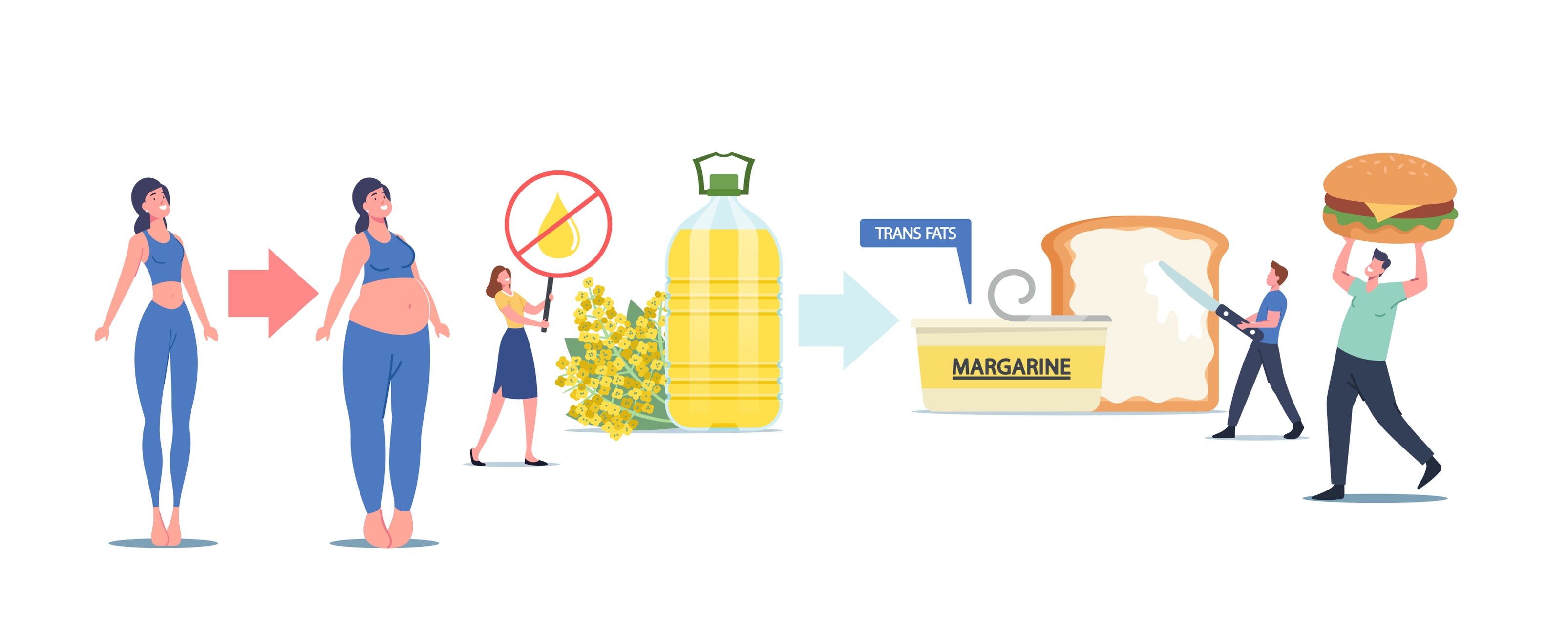Trans Fats: Trouble All the Way!
 Industrially produced trans fats have been linked to numerous health problems
Industrially produced trans fats have been linked to numerous health problems
Authors: Dr. Sonia Chaabane, Dr. Sohaila Cheema, and Dr. Karima Chaabna
An optimal amount of fat (less than 30 percent of total energy intake) is an essential part of a healthy and balanced diet. There are two main types of fat: saturated and unsaturated fats. Fatty acids are the building blocks of the fat in our bodies and in the food we eat. During digestion, fat is broken down into fatty acids, which are then absorbed into the blood.
Trans fats are a type of saturated fatty acids and are either naturally occurring or industrially produced.
Naturally occurring trans fats can be found in meat and dairy products from ruminant animals like cows and sheep. In the absence of evidence on the impact of ruminant trans fats on health, it is recommended for a person to eat reduced-fat dairy foods and lean meats or trim visible fat from meat.
Industrially produced trans fats, often found in oils, are considered the worst type of fat because they are partially hydrogenated to make them more stable at room temperature. Industrially produced trans fats are often used in processed foods because they increase shelf life, give a desirable texture, and increase tolerance to repeated heating. These trans fats can be found in processed foods such as:
- Shortening and stick margarine.
- Commercial baked goods (e.g., cookies, cakes, pastries).
- Frozen foods (e.g., pizza, pies, frozen dinners).
- Refrigerated dough (e.g., biscuits, rolls).
- Fried foods (e.g., French fries, doughnuts, fried chicken).
- Non-dairy creamers and coffee creamers.
- Snack foods like crackers and microwave popcorn.
- Certain types of peanut butter.
- Canned frosting and cake mix.

Effects of industrially produced trans fats on our health
Industrially produced trans fats have been linked to numerous health problems, including:
Partially hydrogenated oils are no longer recognized as safe in human food. They are so unhealthy that most countries worldwide, including Qatar, have adopted initiatives to eliminate industrially produced trans fats from the food supply.
What to watch out for on the ingredient list of foods you buy
- If partially hydrogenated vegetable oil is part of the ingredients list, that means the food contains some industrially produced trans fats.
- Look for foods made with unhydrogenated oil rather than partially hydrogenated or hydrogenated vegetable oils in the ingredients list.
- Products with labels indicating “0 g trans fat” or “ trans fat free” on the Nutrition Facts label can still have small amount of trans fats (0.5 grams of trans fat per serving).
- Remember, eating several servings of foods containing small amounts of trans fats can add up to a harmful quantity of industrially produced trans fats intake daily.
.jpeg)
Reduce your intake of industrially produced trans fats
- For your daily fat intake, prioritize sources of:
- Monounsaturated fats: avocados, pumpkin seeds, sesame seeds, almonds, cashews, peanuts and peanut butter, pecans.
- Polyunsaturated fats (source of omega-6 fatty acids or omega-3 fatty acids): fish, soybeans, chia seeds, flaxseed, walnuts.
- Steam, boil, grill, or use an air fryer instead of frying.
- Cook at a lower temperature. Cooking at very high temperatures and repeated heating of oils that initially have a low content of trans fats can generate additional trans fats and harmful substances.
- If needed for cooking, replace butter, lard, and ghee with unhydrogenated vegetable oils, such as oils from canola (rapeseed), safflower seeds, peanuts, corn, soybean, sunflower seeds, or olives.
- Choose oils that are stable at high temperatures and have a high ‘smoke point,’ such as sunflower and corn oils.
- Use small quantities of oils as they are still high in calories.
- Prioritize homemade food and reduce processed food.
- When eating out, ask what kind of oil the food has been cooked in.
In the food market, trans fats might be replaced with other unhealthy fats, such as saturated fats found in tropical oils like palm oils. Consequently, trans fat free foods are not necessarily healthy. Therefore, shifting towards more plant-based foods will help reduce the amount of unhealthy fat you eat. Remember, when choosing among similar products, compare labels and ingredient lists, avoid trans fats, and choose foods with less saturated fat, less sodium, and less sugar
Sources: Heart and Stroke Foundation of Canada | World Health Organization (WHO) | WHO - The Regional Office for Europe | Mayo Clinic | Food and Drug Administration (FDA) | Frontiers in Nutrition | American Heart Association (AHA), AHA 2 & AHA 3 | Toxicology Reports | Heart UK
Edited by: Ms. Julietta Mirghani